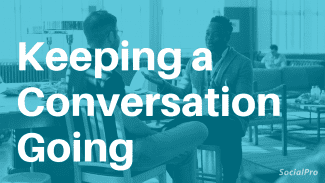“Why can’t I stop talking? When I’m with other people, I often realize that I’m dominating the conversation. I feel bad when I talk too much, but sometimes it feels like I can’t control myself.”
If you want to make friends, you need to be prepared to talk to people. But if you talk too much, you might find it hard to build good friendships. In this article, you’ll learn how to know when to stop talking and have more balanced conversations.
Sections
Signs that you talk too much
1. Your friendships are lopsided
In a healthy friendship, both people feel able to open up and share things about themselves. But if you talk too much, your friends may know far more about you than you know about them. Instead of asking them questions, you might be bombarding them with information about yourself.
2. You are uncomfortable with silences
Silences are a normal part of a conversation, but some people see them as a sign the conversation is failing and rush to fill them. If you feel responsible for filling silences, you may have fallen into the habit of talking about anything and everything that comes to mind.
3. Your friends joke that you talk a lot
Your friends might not want to confront you or have a serious conversation about how much you talk, so they might make jokes to get their message across.
If this is a recurring pattern, try having a frank conversation with your closest friends. Say, “I’ve noticed you sometimes make jokes about me talking too much, and it’s made me think about how I come across. Please tell me honestly, because it would help me out: do you think I’m too chatty?”
4. You tend to have regrets after a conversation
If you catch yourself thinking, “Why did I say that?” or “I really embarrassed myself!” you may be talking too much about personal things that other people don’t need or want to know. Or, instead of oversharing, you might have a habit of getting carried away when you’re talking to someone new and bombard them with too many personal questions.
5. Other people look bored when you talk
If you get the impression that other people “switch off” when you’re speaking, you might be talking too much. For example, they may give minimal answers such as “Yeah,” “Uh-huh,” “Mm,” or “Really?” in a flat voice, gaze into the distance, or start playing with an object such as their phone or a pen.
6. Asking questions makes you feel uneasy
Good conversations move back and forth, with both people asking and answering questions. But if you feel uncomfortable asking people about themselves, you might spend the whole conversation talking about your thoughts and experiences instead.
7. People tell you they don’t have much time to talk
For example, people you see regularly might say, ‘Sure, I can talk, but I only have 10 minutes!” This gives them an easy way out of the conversation. If they think you talk too much, they might have started using this strategy to avoid getting drawn into a long discussion with you.
8. People cut you off or interrupt you
It’s rude to interrupt people, but if you are in a conversation with someone who talks far too much, sometimes cutting them off is the only option. If people frequently talk over you—and they are generally polite otherwise—it might be because it’s the only way they can make themselves heard.
9. You often have to schedule follow-up conversations
If you struggle to cover everything on an agenda within a reasonable amount of time, you might need to learn how to talk less.
For example, if you realize after a one-hour meeting that you haven’t covered an important question that should have taken 30 minutes to discuss, you might have been talking too much. Sometimes the problem might be that someone else is talking too much, but if it’s a recurring pattern, it may be time to look at your conversation habits.
10. You say “It’s a long story” or similar phrases
If you often use these kinds of phrases, you may need to practice getting to the point more quickly:
- “OK, so the backstory is…”
- “For context…”
- “So this won’t make sense unless I tell you how it all started…”
Telling someone that you’re about to launch into a long anecdote doesn’t mean it’s OK to talk for a long time.
How to stop talking too much
1. Learn how to listen properly
You can’t talk and listen attentively at the same time. To be a good listener, you need to do more than wait for a pause in a conversation—you need to engage with what other people are saying.
- If you zone out, politely ask the other person to repeat what they just said.
- Ask for clarification if you aren’t sure about something.
- When someone finishes making a key point, briefly summarize it in your own words to check that you understand them. For example, “OK, so it sounds like you need more help with time management, is that right?”
- Give positive non-verbal cues to encourage the other person to keep talking. Nod when they make a point, and lean forward slightly to show that you are keen to hear what they are saying.
- Do not multitask when you’re listening. It can be easier to absorb what someone is saying when you give them your full attention.
- Try listening to understand rather than listening just for the sake of it. See every conversation as a chance to learn something new. Changing your mindset can make the conversation seem more interesting.
2. Ask questions that encourage others to talk
A conversation doesn’t have to be exactly 50:50, but both people should have the chance to feel heard and share their thoughts. Asking questions gives the person you’re talking to a chance to open up and prevents you from dominating the conversation.
The F.O.R.D. method can help you come up with suitable things to talk about. F.O.R.D. stands for Family, Occupation, Recreation, and Dreams. Focusing on these four topics can help you get to know someone better. Our article on how to keep a conversation going describes several other techniques you can use to keep a conversation balanced.
If you tend to talk about yourself too much and feel as though your friends know you better than you know them, make an effort to ask them meaningful or “deep” questions—and listen carefully to their answers. This list of deep questions to ask your friends might inspire you.
3. Practice reading body language
If you talk for too long, your conversation partner may start to zone out or lose interest. Try to get into the habit of watching out for these signs that someone isn’t engaging with what you’re saying:
- Their feet are pointing away from you
- They are gazing blankly at you, or their eyes have glazed over
- They are tapping their feet or drumming their fingers
- They keep glancing at their surroundings or at other people in the room
- They are playing with an object, like a pen or a cup
If their body language suggests they have tuned you out, it’s time to stop talking. Try turning the conversation back to the other person by asking them a question. If they still don’t appear interested, it might be time to wrap up the conversation—every interaction has to end at some point.
4. Accept that silences are normal
It’s OK to take a break from talking occasionally to gather your thoughts. Silence doesn’t mean that you are boring or that the conversation is ending. If you listen to other people talking, you’ll notice that conversations tend to ebb and flow.
The next time you’re talking to someone, and there’s a pause, practice holding back for a few seconds. Give them a chance to be the one who restarts the conversation.
5. Practice catching yourself when you interrupt
When you improve your listening skills, you’ll naturally stop interrupting so often because you’ll be interested in what the other person has to say.
However, interrupting can be a bad habit that’s hard to break, so you might have to make a special effort not to talk over someone.
There are some times when it’s OK to interrupt—for example if you’re leading a meeting and have to get it back on track—but in general, it’s considered rude and can make the other person resent you.
If you interrupt, apologize and get the conversation back on track. You could say:
- “So sorry for interrupting you. You were saying [brief summary of their last point]?”
- “Oops, sorry, I’m talking too much! To get back to your point…”
- “Apologies for interrupting, please go on.”
If you interrupt people because you’re afraid of forgetting an important point you want to make, remember that you’ll probably have the chance to circle back around the topic in the future. If you’re in a work meeting, discreetly note down your ideas while someone is speaking.
You could also ask your friends to give a signal when you’re interrupting them. This can help you build self-awareness and kick the habit.
6. Get some support for your problems
Some people talk too much because they have worries or problems they need to offload. If you have this issue, it’s important to find the right kind of support. It’s fine to ask your friends to lend you an ear, but if you spend a lot of time talking about your problems, your friends might start to feel as though you’re using them as therapists.
When you need to talk, you could try:
- Using an anonymous listening service such as 7Cups
- Joining an online forum or community for people with similar problems
- Attending an in-person support group
- Talking to a therapist
- Talking to a trusted person or leader in your community or at your place of worship
7. Prepare questions and topics in advance
If you tend to go off on tangents or repeat yourself, deciding which questions you want to ask or which topics you want to talk about can help you stay on track.
For example, if you’re having a meeting at work, write a few questions down on a notepad and make sure they are all ticked off by the end of the meeting. If you’re about to meet up with a friend after a long time and want to catch up on work, family, friends, and hobbies, you could make a list on your phone and review it carefully to make sure you cover everything.
8. Drop your need to be right
If you’re talking about a subject you feel strongly about, it’s easy to start talking at length about your opinions. But the other person may not want to hear what you’ve got to say. They may not care about the subject at all, or they may be feeling too tired for an in-depth discussion.
Look out for signs that you are spending too much time talking about an issue that means a lot to you. For example, you might feel warmer or more jittery than usual, or your voice might become higher pitched. When you notice these signs, take a breath and ask yourself:
- Realistically speaking, am I going to convince this person that I’m right?
- Is it really that important that I share my views right now?
- Am I playing devil’s advocate for no good reason?
Try to accept that we are all entitled to our own opinions and that trying to change someone’s mind when they don’t want to be convinced rarely works.
9. Ask a friend for help
If you have a socially skilled friend, ask them if they’d be willing to help you out stop talking too much.
Try one or more of these strategies:
- During your one-on-one conversations, ask them to tell you directly when you’re talking too much or oversharing.
- Ask your friend to give you a discreet signal when you’re talking too much in group conversations.
- Ask your friend for permission to record a few of your conversations. You might feel self-conscious at first, but after a few minutes, you’ll probably forget that you’re being recorded. Play the recording and analyze how much time you spent talking versus listening.
10. Work on your self-confidence
If you talk too much about your achievements or possessions because you want attention or validation from other people, it may help to focus on growing your self-confidence. When you can validate yourself, you won’t feel the need to impress other people.
Read our in-depth guide on how to improve your self-esteem and how to get core confidence from within.
11. Ask permission before sharing extra details
It’s not always obvious whether someone would like to hear the long version of a story. Some people appreciate details, whereas others prefer to get straight to the point and don’t appreciate any unnecessary information.
If you aren’t sure whether to share extra details, ask the other person if they want to hear them.
After telling a short version of your story that only contains the essential details, you could say something like:
- “So that’s the short version. I can expand on it if you want, but you know the important stuff already.”
- “I’ve skipped over a few little details to save time. There’s more to the story if you want to know about it.”
Do not leave a meaningful pause at the end of your sentence because this can make someone feel obliged to say, “Oh yes, of course I’d like to hear more, tell me!” Be ready to move on to a new topic or put the spotlight back onto the other person by asking them a question.
If you tend to tell rambling stories, you might pick up some useful tips in our article about the principles of good storytelling.
12. Check for underlying causes
In some cases, talking too much or talking too much about a particular topic can be a sign of a psychological or developmental disorder like ADHD or autism spectrum disorder.
If your excessive talking is caused by an underlying condition, you might benefit from a few sessions with a therapist who can give you specialist advice. Use BetterHelp to find an online mental health professional, or ask your doctor for guidance.
If you have an autism spectrum disorder, check out this book: “How To Improve Your Social Skills” by Daniel Wendler. It includes tips on how to start and maintain balanced, enjoyable conversations with other people.
When to end a phone call
It can be hard to know when to stop talking on the phone because you can’t see the other person’s face or body language, so it’s harder to tell when they want to end the call.
Here are a few signs that the other person is no longer interested in talking:
- They are giving minimal answers.
- They are speaking in a flat voice.
- You can hear them moving around or doing something else; this suggests their attention is elsewhere, and they don’t think the call is particularly important.
- There are frequent awkward silences, and you have to be the one who fills them.
- They drop hints that suggest they have other things to do, e.g., “It’s so hectic over here!” or “I can’t believe how much work I’ve got to do today.”
- They say, “It’s been great to talk with you” or “It’s always nice to hear from you” or similar phrases; this is a sign that they want to start winding the call down.
When to stop talking to a guy or girl
When you like a guy or girl, it’s tempting to talk to them as much as possible. But talking to someone or messaging them will make you come across as annoying, desperate, or a pest if they don’t want to hear from you or would prefer to have less contact.
Here are a few hints that it’s time to step back or cut down the amount of time you spend talking to them:
- They suggest meeting up “sometime” but don’t want to make plans. They may be willing to chat casually but have no intention of actually spending time with you. Unless you want a texting buddy, concentrate on meeting new people.
- They are happy to use you as a sounding board but don’t ask about your life or opinions. In this scenario, it’s unlikely you’ll have a mutual relationship with them.
- Your messages are consistently longer than the messages they send you, or you call them much more frequently than they call you.
- They’ve made it clear that they don’t want to date you, either by telling you directly or by saying they aren’t looking for a relationship. You might still be able to keep this person as a friend, but be honest with yourself: if you have a crush on them, it may be too painful to stay in touch.
The first three points also apply to friendships. It’s time to stop talking to a friend, or at least cut back, when it’s clear that your friendship has become imbalanced. Check out our guide to one-sided friendships.
Common questions
How do you train yourself not to talk too much?
Start by practicing active listening. If you focus on the other person rather than yourself, you will naturally give them more space to talk, meaning you won’t dominate the conversation. It also helps to set a formal or informal agenda for a conversation to keep you focused on relevant topics.












